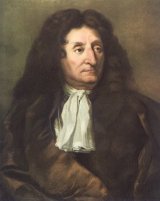Le Loup et l’Agneau
Jean de La Fontaine 1621 (Château-Thierry) – 1695 (Paris)
La raison du plus fort est toujours la meilleure.
Nous l’allons montrer tout à l’heure.
Un Agneau se désaltérait
Dans le courant d’une onde pure.
Un Loup survient à jeun qui cherchait aventure,
Et que la faim en ces lieux attirait.
Qui te rend si hardi de troubler mon breuvage ?
Dit cet animal plein de rage :
Tu seras châtié de ta témérité.
Sire, répond l’Agneau, que votre Majesté
Ne se mette pas en colère ;
Mais plutôt qu’elle considère
Que je me vas désaltérant
Dans le courant,
Plus de vingt pas au-dessous d’elle ;
Et que par conséquent en aucune façon
Je ne puis troubler sa boisson.
Tu la troubles, reprit cette bête cruelle,
Et je sais que de moi tu médis l’an passé.
Comment l’aurais-je fait si je n’étais pas né ?
Reprit l’Agneau, je tète encore ma mère,
Si ce n’est toi, c’est donc ton frère :
Je n’en ai point. C’est donc quelqu’un des tiens :
Car vous ne m’épargnez guère,
Vous, vos bergers, et vos chiens.
On me l’a dit : il faut que je me venge.
Là-dessus au fond des forêts
Le Loup l’emporte, et puis le mange,
Sans autre forme de procès.
Font size:
Submitted by dbtest.10 on January 31, 2021
Modified on April 24, 2023
- 57 sec read
- 204 Views
Quick analysis:
| Scheme | AABAABCCBBAADEFGGFHIAAHAHCJCJ |
|---|---|
| Closest metre | Iambic pentameter |
| Characters | 1,096 |
| Words | 192 |
| Stanzas | 1 |
| Stanza Lengths | 29 |
Translation
Find a translation for this poem in other languages:
Select another language:
- - Select -
- 简体中文 (Chinese - Simplified)
- 繁體中文 (Chinese - Traditional)
- Español (Spanish)
- Esperanto (Esperanto)
- 日本語 (Japanese)
- Português (Portuguese)
- Deutsch (German)
- العربية (Arabic)
- Français (French)
- Русский (Russian)
- ಕನ್ನಡ (Kannada)
- 한국어 (Korean)
- עברית (Hebrew)
- Gaeilge (Irish)
- Українська (Ukrainian)
- اردو (Urdu)
- Magyar (Hungarian)
- मानक हिन्दी (Hindi)
- Indonesia (Indonesian)
- Italiano (Italian)
- தமிழ் (Tamil)
- Türkçe (Turkish)
- తెలుగు (Telugu)
- ภาษาไทย (Thai)
- Tiếng Việt (Vietnamese)
- Čeština (Czech)
- Polski (Polish)
- Bahasa Indonesia (Indonesian)
- Românește (Romanian)
- Nederlands (Dutch)
- Ελληνικά (Greek)
- Latinum (Latin)
- Svenska (Swedish)
- Dansk (Danish)
- Suomi (Finnish)
- فارسی (Persian)
- ייִדיש (Yiddish)
- հայերեն (Armenian)
- Norsk (Norwegian)
- English (English)
Citation
Use the citation below to add this poem to your bibliography:
Style:MLAChicagoAPA
"Le Loup et l’Agneau" Poetry.com. STANDS4 LLC, 2024. Web. 19 Apr. 2024. <https://www.poetry.com/poem/61301/le-loup-et-l’agneau>.



Discuss the poem Le Loup et l’Agneau with the community...
Report Comment
We're doing our best to make sure our content is useful, accurate and safe.
If by any chance you spot an inappropriate comment while navigating through our website please use this form to let us know, and we'll take care of it shortly.
Attachment
You need to be logged in to favorite.
Log In